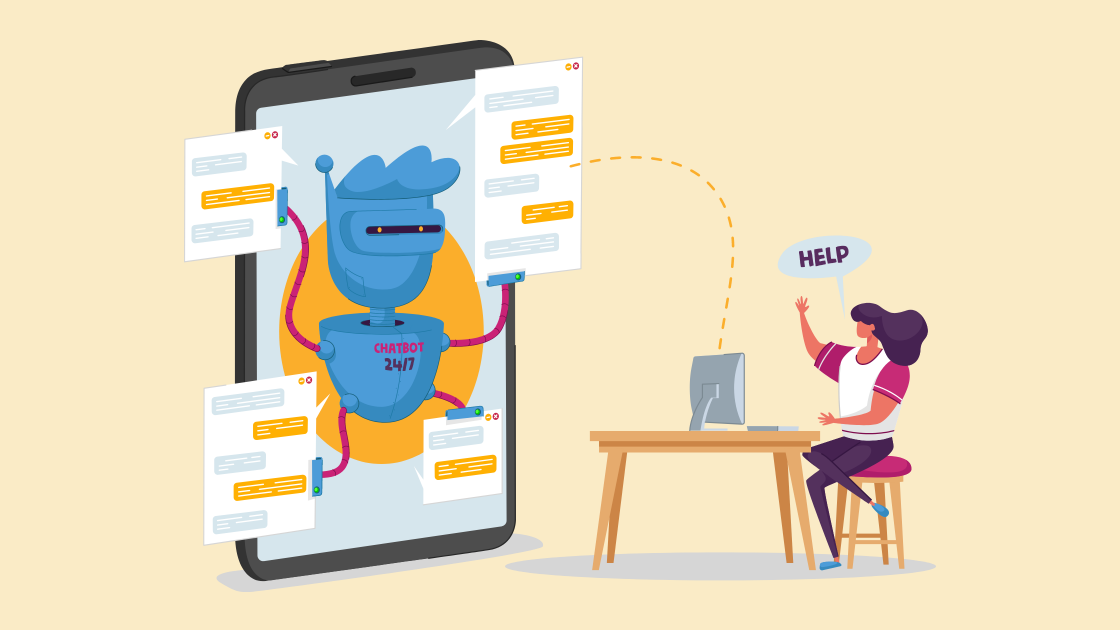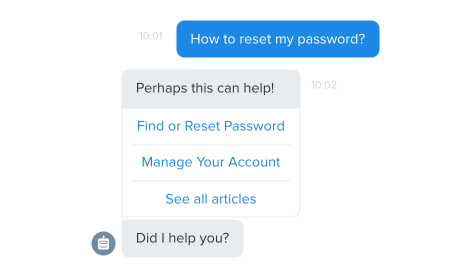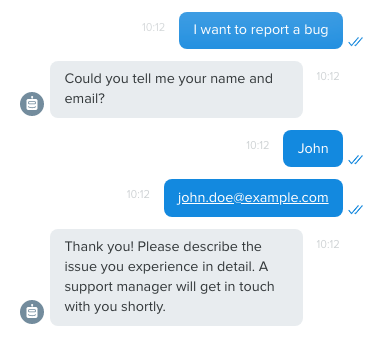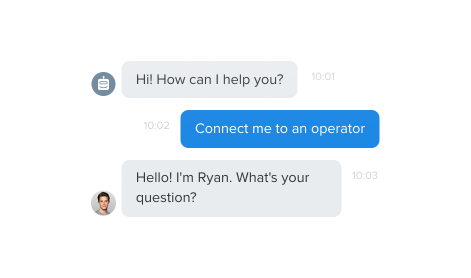How Chatbots are Transforming Customer Service


Customer service plays a vital role in any business. It ensures that your customers get accurate information about your products and services, both before and after they make a purchase. Over the years, customer service has changed dramatically.
Think of the time when face-to-face communication was the only way to get product-related information, and people had to physically visit a store to get support. What a time-consuming process, right? Then came the telephone, and that changed the situation completely. Companies introduced a new way to deliver customer support: call centers, which greatly increased the speed of service and made it much more convenient for customers.
What about now? The telephone is still considered a traditional support channel by many companies. However, the arrival of the Internet and smartphone technologies brought a revolutionary change in customer service. Today’s customers have a huge choice of channels to get in touch with a company, be it a phone call, email, chat, social media, etc.
To gain and maintain customer loyalty, businesses need to constantly optimize their customer service, making it better and faster. This is where automation and chatbots come into play. It seems like everyone is talking about chatbots today, and more and more businesses tend to include chatbots in their customer support strategy. Clearly, chatbots are already creating a major impact in the customer service field.
Let’s discuss how chatbots are changing customer experience and what benefits they have in customer service.
This is one of the main reasons why companies opt for chatbot automation. The days of the 9-to-5, five-days-a-week model are gone. Now, consumers expect 24/7 availability from businesses, and if you fail to provide it, you can lose customers. A couple of years ago, round-the-clock service was something that helped companies stand out from the crowd and differentiate themselves from competitors. Now, it’s an essential thing to stay competitive. If you still don’t provide 24/7 customer service, you may find yourself being left behind.
Not all companies can afford to hire a dedicated team available to support customers day and night, but 24/7 service doesn’t necessarily mean you need to have agents always on the phones. The main point is to provide your customers with a way to get in touch with you whenever they want. Chatbots are a great way to give them this opportunity. They are always online and ready to answer customer questions, making your customer service available even outside your working hours. With chatbots, providing 24/7 support has become a much easier task for many businesses.
Customer support chatbots are a convenient way to reach your company. They provide instant answers, don’t make customers wait, and don’t require talking to a real human agent, which can be stressful for some people. In fact, many people avoid contacting customer support, preferring to find information themselves. The reasons are long waits and hold times, agent-to-agent transfers and having to repeat their problem multiple times, never-ending labyrinths of automated phone menus, etc. Plus, there are many people who are introverted, socially anxious, or just don’t like person-to-person communication. Talking to a support bot will be much more comfortable for them. Plus, customers can contact your chatbot from any device and at any time.
Chatbots are not a universal solution for all customer queries, but they can definitely make the support experience more convenient and effective. Bots help reduce wait times, resolve common issues without the need to contact a support agent, and ensure a smooth and stress-free experience.
One of the growing trends in the customer support domain is self-service. Many customers today want to solve their issues themselves without contacting one of your company’s representatives. Your task is to make it easy for them to do so. Self-service options may include a knowledge base, FAQs, discussion forums, and of course, chatbots, which have already become a common self-service tool.
Chatbots as a self-service solution are beneficial to both customers and companies. Customers can quickly find answers without wasting time on hold, and they feel more satisfied when empowered to handle issues themselves. Also, bots can save you time and resources, so your customer support team no longer has to answer repetitive and similar questions over and over. It’s a win-win for both sides.
Find out what kind of questions your customers ask most often and determine which of them require human involvement and which can be handled by chatbots. Thus, you can quickly route your customers accordingly to the channel where they can get the quickest solution.
To make your customer self-service even more effective, you can connect your bot to a knowledge base. For example, Chaport’s FAQ bot can recognize customers’ messages and suggest relevant help articles directly in the chat. This is a great tool that helps customers quickly find a solution and minimizes the need to contact your support team.

Another way chatbots help businesses in customer support is by gathering customer data. Chatbots may not be able to answer all customer questions, but even if the query is too difficult, support bots can prove useful. They can ask customers about the issue and collect the necessary information before connecting them to a support agent. Also, your support reps will be able to view what questions customers asked during the chatbot conversation.
Thus, your customer service team will get a better understanding of the issue, provide a resolution at a faster rate, and won’t waste time finding out the details. Today, chatbots offer one of the easiest ways to collect customer data.

By deploying a chatbot for your customer service, you get great marketing opportunities as well. Apart from gathering information about customers’ issues, bots can ask for information that can be used by your marketing and sales teams. For example, chatbots can collect email addresses and other user details within the conversation flow and even pass the collected info to your CRM or email marketing system.
Also, customer service chatbots offer a perfect opportunity for you to collect customer feedback, which is important and valuable for every business. They can ask your customers if they are satisfied with your products and services, identify their interests, likes and/or dislikes, and give you insights into what your audience truly wants. Using this information, you can enhance lead engagement, improve your products and services, increase customer satisfaction, and make better product recommendations.
And don’t forget that chatbots can work 24/7 and initiate chats with your visitors. This will help you to reach a wider audience and increase your lead generation.
In many cases, companies use chatbots in combination with live chat to deliver better customer service. Using both chatbots and live chat, you will get all the benefits of the two approaches, which complement each other perfectly. Let your chatbots handle all the standard customer queries so that your customers can get an instant answer and your support agents can save time for more important tasks. More complex queries can be easily transferred to your operators, who can continue chatting with your customers and provide them with the right solution.

Chatbots help businesses provide proactive customer service. Being proactive with customers is another one of the biggest trends in customer service. This approach assumes that you need to identify and resolve customer issues before they occur. It is the opposite of reactive customer service, which comes only after a customer has a problem or complaint. Most companies still adhere to the traditional strategy of reactive customer support, but today it is also important to stay one step ahead and anticipate customer needs. It can reduce the number of support queries, free up your team, and keep your customers happy all at the same time.
Every customer journey is different, but generally, customers often stumble upon the same problems. You should identify the situations when customers might need help and provide support before such situations arise.
A chatbot is an ideal tool to reach your customers and offer them help when necessary. With chatbots, you can contact your customers at the right moment, when they can potentially have some difficulties. For example, you can write different scenarios and set up chatbots to reach your customers depending on the website page they are on. In Chaport, it is possible to provide multiple conditions to trigger a chatbot, including page URL, time on page, number of page views, language, country, etc.
Customer service automation is one of the easiest ways to improve your productivity and efficiency. First of all, as stated before, chatbots can automate some customer queries, relieving support agents of the need to handle a ton of repetitive questions. Secondly, chatbots automate data collection, including details about customer issues, contact information, and feedback.
By automating some customer service tasks, chatbots save time for your support team so that agents can focus on more relevant tasks and show greater performance. Thanks to the reduced number of queries, your support agents can pay more attention to customers with more difficult questions, answer them faster, and provide better service. This will increase customer loyalty, improve retention, and bring more sales opportunities.
Customer service can cost a lot. Many businesses receive thousands of customer queries every day, and some companies still solve all queries manually. This can require a large support team and significantly affect the budget. Labor costs are considered one of the biggest costs of a business and include employee wages, benefits, insurance, payroll, and other related taxes.
According to Chatbots Magazine, businesses can reduce customer service costs by up to 30% by implementing chatbots. Indeed, they can automate multiple tasks to save you money. Plus, to create a chatbot for your website, you no longer need to build it from scratch and hire developers, which can be rather expensive. Today, you can use third-party platforms where you can create your own chatbot scenarios at much more affordable prices and without any programming. For example, in Chaport, you can use a WYSIWYG scenario editor that allows you to build a bot in minutes. Try it yourself and see how easy it is!
Customer service is constantly evolving in line with the development of new technologies and changes in consumer behavior. Customer expectations are increasing all the time, and businesses always need to stay up to date. What’s more, constant competition requires businesses to create new ways and implement new tools to win customer loyalty.
Chatbots provide a great support channel to connect businesses and customers. Bots are massively changing the way businesses deliver customer service. They help provide 24/7 support, reduce the number of person-to-person interactions, save time and resources, and boost employee productivity. And that’s not all. Chatbot technology will continue to develop and change the customer experience. Create a chatbot for your business now, and don’t miss the hottest new trends in customer service that your competitors are already taking advantage of.
